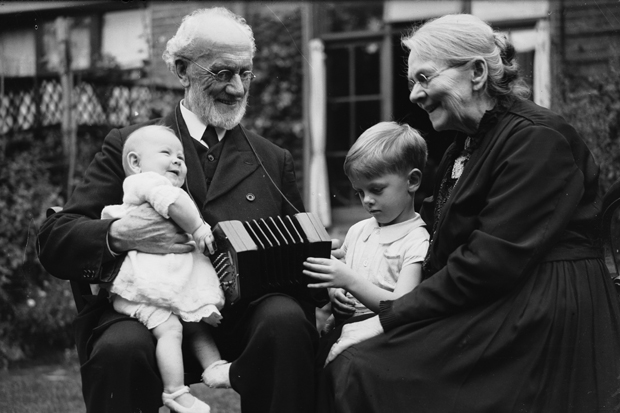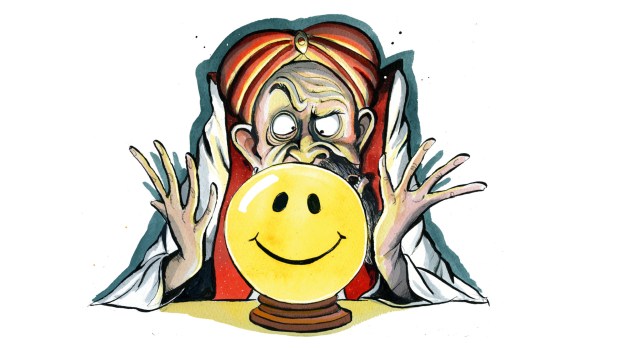We are living longer, healthier and more prosperous lives than ever — it’s one of the greatest advances of our time, and yet our politicians prefer to see it as a disaster. ‘We are facing a time bomb,’ says the Liberal Democrat Norman Lamb, a health minister. He presents the numbers as if we are supposed to be appalled: ‘by 2030 England will have double the number of over-85s. The number of over-65s will have increased by 50 per cent.’ In other words: oh my God, we’re all going to live.
It’s odd that the Liberal Democrats should be so alarmed by the fact that there will be half a million of us who have celebrated 90 or more Christmases — three times as many as there were in the 1980s. Mr Lamb’s ‘time bomb’ is nothing to dread. It means that this Christmas many more families will be celebrating across the generations.
Of course, Mr Lamb has half a point. Longer lives mean greater demands on care and hospital services. The pensions minister also has issues to address: extrapolate any trend far enough into the future and you can foresee disaster. But that is to ignore the possibility that action can be taken to solve the problem. On any issue — climate change, population growth, oil supply — there are ways to predict that we’re all doomed. But they seldom come to pass, thanks to human ingenuity and progress. Things often go badly wrong. But more often than not, they go wonderfully right.
Who would have thought, for example, that pensioners would be driving the British job-creation miracle? David Cameron and Iain Duncan Smith rightly boast that there are more people in work now than ever. But we seldom hear that a third of the rise in employment is accounted for by the over-65s. There are now more than a million pensioners who are — from choice or necessity — working and paying taxes, twice the number of a decade ago. So it is rather simplistic to say that pensioners are an ever-heavier burden on working-age people. They are carrying a share of the burden themselves.
Officials still make assumptions based on the bizarre premise that people become economically useless on the day they turn 65. Employers, on the other hand, are delighted to keep hiring a generation of people who have a strong sense of duty and an old–fashioned work ethic.
And this is just conventional work. How many young couples have their working (and personal) lives made much easier by support from their parents, who nowadays often have the good health and stamina required to let them provide a free taxi service and babysitting? The old line — ‘Darling, let’s have babies while our parents are still young enough to look after them’ — has ceased to be a joke. When people are healthier for longer, they are far more able to support their families for longer — the importance of which is impossible to quantify. Improvements in medicine mean more people are active for longer — helping the older generation, their families, their employers, their volunteer groups and society at large.
It is forgotten that today’s pensioners are also fit enough to care for their own parents. Again, it’s hard to put a figure on it, but Carers UK estimates that 1.3 million pensioners are caring for disabled or older loved ones. Mr Lamb seems worried by this. “When we think of a carer I’m sure many of us imagine someone middle-aged caring for mum or dad, perhaps whilst juggling the pressures of bringing up their own children,” he wrote last month.“But we now have grandparents caring for great-grandparents.”
Indeed we do, and Carers UK estimate that they save the economy £120 billion a year. More people are looking after each other – and this is something to be applauded. We should be saluting those who care for their family this way, and Mr Lamb should conclude that this trend is another reason not to view pensioners as weak or helpless. They’re fit, working – and caring. Is this really a time bomb?
Even the Care UK figures do not recognise the amount of voluntary work which so many people take up in their retirement. Nor do they factor in the most valuable contribution of all: the wisdom and love which is being passed down the generations.
A century ago, The Spectator’s pages made scarcely any mention of Christmas. There was no mood for celebration. By the end of the war there were a million new spaces around family dining tables. In the coming century, more and more children will get to spend Christmas with their grandparents and great-grand-parents. That is a cause for wholehearted celebration.
Got something to add? Join the discussion and comment below.
Get 10 issues for just $10
Subscribe to The Spectator Australia today for the next 10 magazine issues, plus full online access, for just $10.
You might disagree with half of it, but you’ll enjoy reading all of it. Try your first month for free, then just $2 a week for the remainder of your first year.














Comments
Don't miss out
Join the conversation with other Spectator Australia readers. Subscribe to leave a comment.
SUBSCRIBEAlready a subscriber? Log in